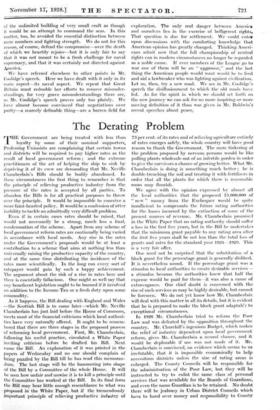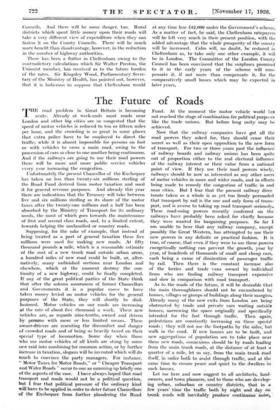The Derating Problem
THE Government are being treated with less than loyalty by some of their nominal supporters. Professing Unionists are complaining that certain towns and distriets will be required to pay higher rates as the result of local government reform ; and the extreme practitioners of the art of helping the ship to sink by depriving it of its crew are demanding that Mr. Neville Chamberlain's Bills should be bodily abandoned. In these circumstances the first thing to remember is that the principle of relieving productive industry from the pressure of the rates is accepted by all parties. To abandon the Bills is for all practical purposes to throw Over the principle. It would be impossible to conceive a more faint-hearted policy. It would be a confession of utter inability to tackle an admittedly very difficult problem.
Even if in certain cases rates should be raised, that would not necessarily be a strong, much less a final, condemnation of the scheme. Apart from any scheme of local government reform rates are continually being varied in accordance with local needs. Any rise in the rates under the Government's proposals would be at least a contribution to a scheme that aims at nothing less than universally raising the productive capacity of the country, and at the same time distributing the incidence of the rates more scientifically. In the long run every sort of ratepayer would gain by such a happy achievement. The argument about the risk of a rise in rates here and there is essentially fallacious. One might as well say that any beneficent legislation ought to be banned if it involved an addition to the Income Tax or a fresh duty upon some commodity.
As it happens, the Bill dealing with England and Wales —the Scottish Bill is to come later—which Mr. Neville Chamberlain has just laid before the House of Commons, meets most of the financial criticisms which local authori- ties have very naturally offered. It ought to be remem- bered that there are three stages in the proposed process of reforming local government. First, Mr. Chamberlain, following his useful practice, circulated a White Paper inviting criticism before he drafted his Bill. Next came the Bill. An explanation of it was printed in the papers of Wednesday and no, one should complain of being puzzled by the Bill till he has read this memoran- dum. The last stage will be the hammering into shape of the Bill by a Committee of the whole House. It will be seen how unfair and unwise it is to kill a principle until the Committee has worked at the Bill. In its final form the Bill may bear little enough resemblance to what was proposed in the White Paper, but if the tremendously important principle of relieving productive industry of 75 per cent. of its rates and of relieving agriculture entirely of rates emerges safely, the whole country will have good reason to thank the Government. The mere tinkering at the problem proposed by nervous persons would be like pulling plants wholesale out of an infertile garden in order to give the survivors a chance of growing better. What Mr. Chamberlain is doing is something much better ; he is double-trenching the soil and treating it with fertilizers in order that all the plants for which there is reasonable room may flourish.
We agree with the opinion expressed by almost all the local authorities that the proposed £5,000,000 of " new " money from the Exchequer would be quite insufficient to compensate the future rating authorities for the losses incurred by the extinction of some of the present sources of revenue. Mr. Chamberlain promised in the White Paper that no rating authority should suffer a loss in the first five years, but in the Bill he undertakes that the minimum grant payable to any rating area after the first five years shall be not less than the total loss of grants and rates for the standard year 1928--1929. This is a very fair offer.
One need not be surprised that the substitution of a block grant for the percentage grant is generally disliked. It is nevertheless sound. If the percentage grant was a stimulus to local authorities to create desirable services— a stimulus because the authorities knew that half the expense would be paid for them—it was also a cause of extravagance. Our chief doubt is concerned with the rise of such services as may be highly desirable, but cannot be foreseen. We do not yet know how Mr. Chamberlain, will deal with this matter in all its details, but it is evident that he is prepared to make the block grant adaptabl?, to exceptional circumstances.
In 1926 Mr. Chamberlain tried to reform the Poor Law and was defeated by the opposition throughout the country. Mr. Churchill's ingenious Budget, which makes the relief of industry dependent upon local government reform, gives Mr. Chamberlain a second chance, and it would be deplorable if use was not made of it. Mr. Chamberlain is convinced, on evidence which seems to us irrefutable, that it is impossible economically to help necessitous districts unless the size of rating areas is enlarged. The County Councils will be responsible for the administration of the Poor Law, but they will be instructed to try to enlist the same class of personal services that was available for the Boards of Guardians, and even the name Guardian is to-be retained. No doubt there will be jealousy in Urban District -Councils which have to hand over money and responsibility to County Councils. And there will be some danger; too. Rural distriets which spent little money upon their roads will take a very different view' of expenditure -when they can fasten it on the County Councils. There will be much more benefit than disadvantage, however, in the reduction in the number of highway authorities.
There has been a flutter in Cheltenham owing to the contradictory calculations which Sir Walter Preston, the Unionist member, has received as to the future burden of the rates. Sir Kingsley Wood, Parliamentary Secre tary of the Ministry of Health, has pointed out, however, that it is ludicrous to suppose that Cheltenham would at any time lose £42,000 under the Government's scheme. As a matter of fact, he said, the Cheltenham ratepayers will be left very much in their present position, with the added advantage that the whole prosperity of the county will be increased. Calm will, no doubt, be restored in Cheltenham as, to take only one other example, it will be in London. The Committee of the London County Council has been convinced that the surpluses promised to it in the early years of the scheme will com- pensate it, if not more than compensate it, for the comparatively small losses which may be expected in later years.







































 Previous page
Previous page